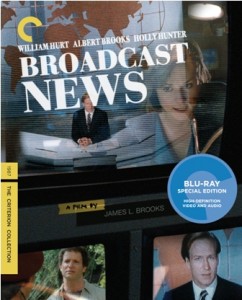 It’s Thanksgiving week…and so we give thanks to Barnes & Noble, which in July and November has a half-off sale on all Criterion Collection DVDs and Blu-rays. Perfect for Christmas stocking stuffing and Christmas season wallet preservation, or, of course, self-indulgence…and I tend to gorge every year. (For all the Criterions I own, I always find more I want to own every fall and summer.)
It’s Thanksgiving week…and so we give thanks to Barnes & Noble, which in July and November has a half-off sale on all Criterion Collection DVDs and Blu-rays. Perfect for Christmas stocking stuffing and Christmas season wallet preservation, or, of course, self-indulgence…and I tend to gorge every year. (For all the Criterions I own, I always find more I want to own every fall and summer.)
There was some trepidation earlier this year when the beloved brand announced a Hulu Plus channel online–was Criterion throwing aside us collectors for streaming? Nope, just advertising the spectacularly produced musculature of its physical media (the Hulu versions seem barren of supplements) and perhaps previewing titles to come. (Is Criterion putting out, so to speak, David Hamilton softcore from the 80s? The stuff I watched on Cinemax after midnight is now art? Really? When?) The discs have continued as usual…and next year begins with the “biggest” release of them all, as Criterion looses its DVD and Blu-ray of Godzilla (1954) on the world.
Meanwhile, here’s eleven 2011 releases worth adding to your shopping bag before today (that’s right, today) rolls over into Tuesday and you have to wait until 2012 for another round of bargain shopping.
Broadcast News (1987). As James L. Brooks’ lousy How Do You Know was tanking in theaters last winter the movie that is line-for-line his best resurfaced, rescuing it from a prior poor DVD transfer. (Which reminds me that Holly Hunter’s other 1987 classic, Raising Arizona, is also finally available in a version that does it justice.) I hadn’t seen it in years until I tuned into a Fox Movie Channel telecast midway and was hooked–such a vibrant, pointed screenplay, with valid (and funny) insights into work, romance, and personal and professional ethics, and beautifully acted down to the smallest bit part. It also has a look to it, too, and a shape, something Brooks isn’t given proper credit for, maybe because his later films are slovenly by comparison. I thought, “Criterion should really do this”–and lo and behold, it has. The TV news business has splintered but Broadcast News holds up.
Best Bonus. We hear a lot from and about Brooks in a commentary track and documentary. I liked the concise interview with Susan Zirinsky, the model for Hunter’s character.
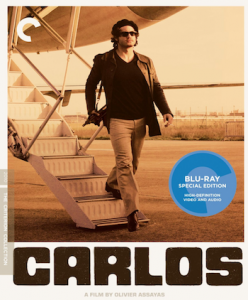 Carlos (2010). The film ranked No. 5 on my Top 10 list last year. Carlos had the makings of a top-flight Criterion disc and so it is. Over five-and-a-half enthralling hours Olivier Assayas brings the pathetic phenomenon of the “world’s most fearsome terrorist” to life–hustler, ringleader, menace, media sensation, failure, scapegoat, fat, crashing bore. The whole sad carnival come to vivid life. From prison Carlos threatened reprisals upon the filmmakers but the dustbin of history failed to stir; the production is a potent reminder of that particular flashpoint.
Carlos (2010). The film ranked No. 5 on my Top 10 list last year. Carlos had the makings of a top-flight Criterion disc and so it is. Over five-and-a-half enthralling hours Olivier Assayas brings the pathetic phenomenon of the “world’s most fearsome terrorist” to life–hustler, ringleader, menace, media sensation, failure, scapegoat, fat, crashing bore. The whole sad carnival come to vivid life. From prison Carlos threatened reprisals upon the filmmakers but the dustbin of history failed to stir; the production is a potent reminder of that particular flashpoint.
Best Bonus. Lots here on two discs, notably a French program about “the Jackal” from 1997 and another documentary about the Carlos-sanctioned bombing of the Maison de France in West Berlin in 1983, featuring interviews with two of the terrorist’s wives.
Cul-de-sac (1966). Roman Polanksi has a new movie out, Carnage. And via Criterion he also has this old movie out, which, given its relative obscurity over the decades, is practically a new one, too. It’s an absurdist fusion of noir, crime, and horror movies, wherein a mismatched couple (Donald Pleasence and Francois Dorleac) are unsettled by a pair of gangsters who intrude upon their castle home in Northern England. A movie where Pleasence gets dolled up in drag is indefinable, but, if you admire Polanski’s films, unmissable. (It’s said to be a favorite of Chinatown star Jack Nicholson’s.)
Best Bonus. A retrospective piece about the difficult location shoot, including the circumstances that led to the filming of one seven-and-a-half-minute continuous take, a record at that time.
Harakiri (1962). I love samurai movies, and so does Criterion, which has a few outstanding ones (like The Seven Samurai and Samurai Rebellion) in the collection. This is an unusually introspective one, however, from director Masaki Kobayashi (The Human Condition), with Tatsuya Nakadai (Ran) as a ronin without illusions, recounting his bleak story as he insists upon death by seppuku. The action is as much internal as external as Kobayashi strikes a blow at the rotten feudal system.
Best Bonus. A 2005 interview with the great Nakadai, who turns 80 next year.
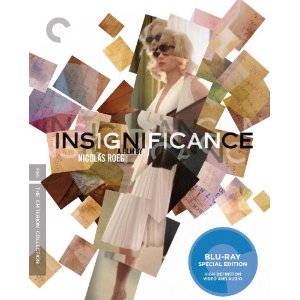 Insignificance (1985). The buzz this week is about Michelle Williams playing Marilyn Monroe in My Week with Marilyn. Theresa Russell did the same thing, sort of, in one of her unclassifiable movies with ex-husband Nicolas Roeg (The Man Who Fell to Earth). Based on a play by Terry Johnson (most recently the Tony-winning director of the recent revival of La Cage aux Folles), it gathers the Actress (Russell), the Ballplayer (Gary Busey), the Professor (Michael Emil), and the Senator (Tony Curtis) in a hotel room for a series of seriocomic confrontations, all hinged on the theory of relativity. An Oscar season vehicle it’s not, though there is food for thought, some of it quite tasty, here.
Insignificance (1985). The buzz this week is about Michelle Williams playing Marilyn Monroe in My Week with Marilyn. Theresa Russell did the same thing, sort of, in one of her unclassifiable movies with ex-husband Nicolas Roeg (The Man Who Fell to Earth). Based on a play by Terry Johnson (most recently the Tony-winning director of the recent revival of La Cage aux Folles), it gathers the Actress (Russell), the Ballplayer (Gary Busey), the Professor (Michael Emil), and the Senator (Tony Curtis) in a hotel room for a series of seriocomic confrontations, all hinged on the theory of relativity. An Oscar season vehicle it’s not, though there is food for thought, some of it quite tasty, here.
Best Bonus. Roeg and producer Jeremy Thomas, the go-to guy for so many challenging films then, explain themselves in a video interview.
Kes (1969). My movie group showed this a few years back. We may need to show it again, as this fine Criterion presentation uplifts the whole movie, which had fallen into disrepair over the decades. The story of a 15-year-old miner’s son and his spiritually revivifying relationship with a wild kestrel is the cornerstone of British filmmaker Ken Loach’s sterling reputation (though we here across the pond need to have the earlier Poor Cow, with Terence Stamp, more available, and that is a suggestion) and a worthwhile viewing experience even under only adequate conditions. The Blu-ray restores the rough beauty of Chris Menges’ cinematography, which is reason enough for a purchase.
Best Bonus. Loach, Menges, producer Tony Garnett, and the film’s star, David Bradley (who auditioned for the free food and drink the production was offering) are all interviewed. But the most gratifying extra is an earlier film of Loach’s, the homelessness drama Cathy Come Home (1966).
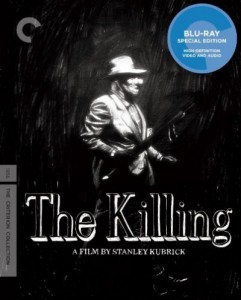 The Killing (1956). This hardboiled noir detailing a racetrack robbery put Stanley Kubrick on the map, and filmmakers still quote from it. (The ironic outcome of the big heist is practically a cliche now, not that the ingenious direction won’t grab you.) It’s an essential, pure and simple, with one of the great lowlife casts, including the aspirational Sterling Hayden (later of Dr. Strangelove fame) and perennial inhabitants of the bottom depths Elisha Cook, Jr., Marie Windsor, and Timothy Carey.
The Killing (1956). This hardboiled noir detailing a racetrack robbery put Stanley Kubrick on the map, and filmmakers still quote from it. (The ironic outcome of the big heist is practically a cliche now, not that the ingenious direction won’t grab you.) It’s an essential, pure and simple, with one of the great lowlife casts, including the aspirational Sterling Hayden (later of Dr. Strangelove fame) and perennial inhabitants of the bottom depths Elisha Cook, Jr., Marie Windsor, and Timothy Carey.
Best Bonus. Another whole movie, Kubrick’s earlier, uneven Killer’s Kiss (1955), of interest for signs of the leap forward just ahead.
Leon Morin, Priest (1961). Best known here for outstanding existential gangster films like Le Samourai (1967), Jean-Pierre Melville had a few posthumous surprises for us Americans. One was the great French Resistance thriller Army of Shadows (1969), which topped a number of Top 10 lists, including my own, when it was finally shown here in 2006. Criterion adds to its Melville holdings with this Resistance-set drama, a smash hit in France that fills a gap in his resume here. Jean-Paul Belmondo and Emmanuelle Riva, the respective stars of the New Wave sensations Breathless and Hiroshima Mon Amour, play the more traditional roles of a charismatic priest and an atheist widow, but their relationship proves anything but conventional in a turbulent era.
Best Bonus. Melville expert Ginette Vincendeau returns to discuss selected scenes, as deleted scenes offer tantalizing glimpses of the three-hour epic that the director whittled away at to arrive at this version.
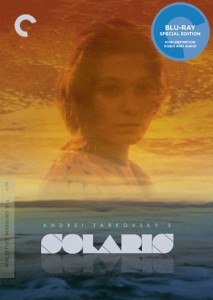 Solaris (1972). Science fiction meets “slow cinema” in what has become a litmus test for art, aridity, and pretension in the movies. A lot of “cultural vegetables” are stringier than this Soviet specimen, however, which overflows with stimulating ideas adapted from Stanislaw Lem. It may be the best place to start an odyssey through the films of Andrei Tarkovsky–that is, if you’re man enough. (Watching Steven Soderbergh’s Cliff Notes remake of 2002 to prepare is cheating.) My advice is to forget the advance word and open yourself up to the experience, then, if you dare, move on to Stalker and the rest. You have nothing to lose except your assumptions.
Solaris (1972). Science fiction meets “slow cinema” in what has become a litmus test for art, aridity, and pretension in the movies. A lot of “cultural vegetables” are stringier than this Soviet specimen, however, which overflows with stimulating ideas adapted from Stanislaw Lem. It may be the best place to start an odyssey through the films of Andrei Tarkovsky–that is, if you’re man enough. (Watching Steven Soderbergh’s Cliff Notes remake of 2002 to prepare is cheating.) My advice is to forget the advance word and open yourself up to the experience, then, if you dare, move on to Stalker and the rest. You have nothing to lose except your assumptions.
Best Bonus. For gluttons of punishment (I kid) there are 25 minutes worth of deleted and alternate scenes. Tarkovsky died in 1986 but a number of his colleagues survive; I found Eduard Artemyev’s overview of how he composed the film’s electronic score to be of particular interest.
Something Wild (1986). A shame that the archives of the Daily Northwestern don’t reach back to the prehistory of the 80s, where you’d find my (if I do say so myself) wonderful interview with filmmaker Jonathan Demme, surely one of the nicest (and most candid) people involved in the movies. Five years before the staggering success of The Silence of the Lambs he was still an outlier in Hollywood, and Something Wild (which floored me when I saw it, as much as Blue Velvet that same fall) may be his best film, a flavorfully scored joyride with Jeff Daniels and Melanie Griffith (surely her best performance) and a few hairpin turns provided by a scary Ray Liotta. Still an unknown quantity with viewers, it’s best to see it cold, as I did. Even if it didn’t give me a chance to talk to Demme I’d still love it.
Best Bonus: Not as much here as usual, then again the movie speaks for itself. Demme and screenwriter E. Max Frye are featured in video segments. If anyone had asked I would have provided my Daily interview…
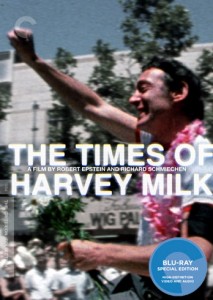 The Times of Harvey Milk (1984). If the 2008 biopic whetted your appetite to see the Oscar-winning documentary, hunger no more with this definitive presentation. Combined with some choice extras, including a piece with the makers of both films on Harvey Milk’s legacy, you get a full portrait of those heady days of promise, change, and disaster in San Francisco. It’s a landmark of its genre.
The Times of Harvey Milk (1984). If the 2008 biopic whetted your appetite to see the Oscar-winning documentary, hunger no more with this definitive presentation. Combined with some choice extras, including a piece with the makers of both films on Harvey Milk’s legacy, you get a full portrait of those heady days of promise, change, and disaster in San Francisco. It’s a landmark of its genre.
Best Bonus: The Harvey Milk recordings collected here are priceless. And there is a discussion of the trial of Milk’s killer, Dan White, that addresses the controversial “Twinkie defense.”
12 Angry Men (1957). I can’t help myself with Criterion so I went to 12. It is, however, a ringer, in that it’s not available untll Tuesday and not part of this sale. But why not treat yourself to this American classic? Do it in memory of the late Sidney Lumet, whose first feature this was in a prolific 50-year film career. He was certainly prepared, having directed much live television beforehand, and he brought that particularly density of vision to this closed but never claustrophobic courtroom drama, which, like The Killing, is far more alive visually compared to the bewhiskered, featureless disc issued by MGM at the dawn of DVD time. Starring the unimpeachable Henry Fonda and Lee J. Cobb; co-stars who proved themselves more than numbers in subsequent years include Martin Balsam, Jack Klugman, and E.G. Marshall. The durable material was as big a hit as ever when it became a Broadway stage play in 2004 and toured the country.
Best Bonus: Hard to pick given that the choice includes a selection of Lumet interviews and a discussion of the great cinematographer Boris Kaufman by DP John Bailey (Ordinary People) but I’m casting my vote for Reginald Rose’s original 1954 teleplay, directed by Franklin J. Schaffner (Planet of the Apes, Patton).





Comments